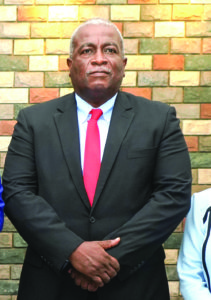With only 25% of works completed on the Kato hydropower project in Region Eight, Prime Minister Mark Phillips has announced that the project deadline is now scheduled for December 31st this year and that some $80 million will go towards the construction of a distribution network.
Phillips, who has the responsibility for power generation, made the disclosure during the consideration of estimates for his office on Tuesday in the Committee of Supply.
“The contract was awarded in September 2019 after being tendered twice. The project should have been completed in March 2021 but as it is, it is only 25% completed now and the new completion date is December 31st, 2021,” he said as he responded to questions from former Minister of Public Infrastructure David Patterson.
Patterson had asked at what stage of completion is the project and whether it will cater for power distribution into Karasabai.
Phillips then told the House that under the APNU+AFC, a decision was made to not go ahead with that plan, a decision that was supported by the loan agency, Inter-American Development Bank. However, Patterson claim-ed that Phillips was misinformed.
In September 2019, under the APNU+AFC government, a contract for the, “Design, Supply and Installation of a 150kW hydropower plant on the Cheung River, at Kato Village, in Region Eight was awarded and signed.
“This contract was awarded to B & J Civil Works to the tune of US$2,251,880 and the funding of the project will be provided through the Inter-American Development Bank under the Sustainable Energy Pro-gram for Guyana,” the ministry had stated in a post on its Facebook page.
“This project is expected to run for a period of 18 months with 12 months defects and liability period after the completion of the project,” it added.
The Kato project comprises three components: 1)the construction of 150kW hydropower plant on the bank of the Cheung River (this includes wire, intake, headrace canal with sand trap, forebay, penstock, and power house; 2) the construction of 13.8KV Transmission Network (Kato Hydro Station, Secondary School and Kato Village; and 3) the construction of 120V Distribution Network in Kato Village.
According to the ministry, the objective of the project is to provide Kato with a relatively cheap and reliable source of power that will result in livelihood enhancements. Phillips further informed the House as he responded to Patterson’s query on the tariff for electricity in the village, that when the project is completed, residents will be charged $84 per kilowatt.
Further, it was disclosed that $15 million was to be spent on the upgrading and extension of St Cuthbert’s Mission for its power distribution network.
Phillips noted that additional generators are being procured to enhance the power generation capacity at three hinterland communities. These generators are being procured at a cost of $13 million for Mahdia, $8 million for Karasabai, and $15 million for Port Kaituma. In addition, he disclosed that plans are already in progress to install mini-grid systems at Bartica, Mahdia and Lethem.
“Bartica and Lethem have been awarded, whereas Mahdia, we are completing the environmental impact assessment and after that it will go through the process for it to be awarded,” Phillips told the Committee of Supply after being questioned on the status of the project by Patterson.
Responding to questions on the Power Utility Up-grade Programme, Phillips noted that the programme has yielded a 5% reduction in electricity line loss over the last six years. It was also pointed out that this Inter-Development Bank-funded programme expires in October of this year. To date 75 per cent of the project has been completed.
Under the $1.8 billion allocated to the project, sums will be spent on implementation of systems management software and institutional strengthening for loss reduction, rehabilitation of distribution networks, rehabilitation of sub-stations at Kingston and Vreed-en-Hoop, and the upgrade/relocation of distribution transformers.
However, with the allotted time for discussion on the estimates having expired, members of parliament were unable to pose questions regarding the other sector that falls under the Prime Minister’s office.
Speaker of the House Manzoor Nadir told members that they were working with a schedule and the allotted 90 minutes had expired. On that note, he informed Member of Parliament Cathy Hughes, that her questions for the Prime Minister could not be entertained.
Subsequently, the budgetary allocations for the agencies under Telecommunication and Innovation were approved without question.
Of the $12.8 billion earmarked for the Office of the Prime Minister, $7.1 billion will be spread across the agencies for current expenditure with $5.6 billion earmarked for capital expenditure.









